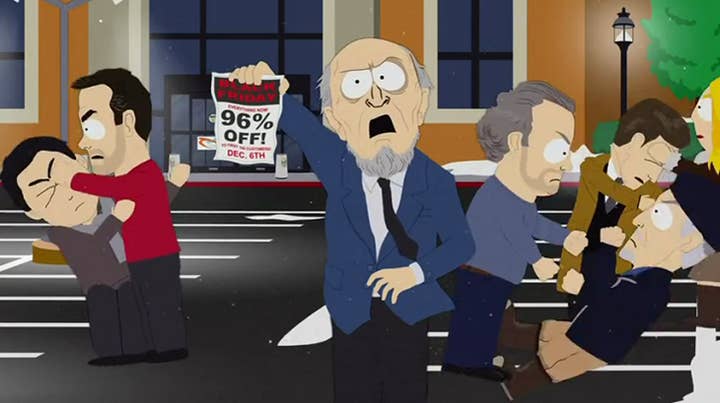Marketing Black Friday
The biggest sales day of the year is also the biggest marketing event of the year
Black Friday is, on the surface, a big retail sales day in the United States based on the fact that most people in the USA have the Friday after Thanksgiving as a holiday. Thus, this day has become the traditional start of serious holiday shopping for most people. However, the Black Friday tradition has expanded in time and space, and it has become a key milestone in holiday marketing plans for game publishers. Given that the holiday quarter is traditionally the very best part of the year for selling games, it's easy to see why Black Friday has become the most important event of the year for marketers. Let's take a closer look at what this event means for game marketers.
Black Friday has expanded in many ways since its origins - the term itself began as a description of the heavy traffic caused by shoppers in Philadelphia. Later the term was said to describe the day that retailers first started turning a profit (being "in the black" in accounting parlance), though this is at best an apocryphal explanation. Since around 2003, the day has been the busiest shopping day of the year in the USA.
While originally Black Friday sales didn't begin until 6 am Friday morning, stores have begun rolling back the start times. Now even a midnight start isn't the earliest; some stores open at 8 pm on Thanksgiving. Many stores have even spread the event earlier, back into the previous week or two for some sale prices. The greatest discounts are usually reserved for a limited supply of "doorbuster" items, aimed at bringing people to a particular retailer under the theory that once people are in the door, they'll do most of their holiday shopping at that store.
Why the ferocious marketing scramble to be the place where customers head to first for holiday shopping? The prevailing theory around Electronic Arts back in the 1980s, held by then-head of sales Larry Probst, was that it was important to lock up those "open to buy" dollars" from retail chains. Probst always launched a "Buy Two, Get One Free" promotion for EA games in the fall, and he always wanted to get it underway before Activision or anyone else launched their promotions. He knew that retailers, and consumers, only have a certain amount to spend - and if you're the first one with an attractive offer, you're closing out some of the competition.
"Clever marketers push for the development of special holiday content for games, giving people an extra reason to try out a title while enjoying visual reminders of the season"
The same principle applies today, even though the battle has moved mostly to cyberspace for games. The retail store battle is still vital in many ways, but the Black Friday competition has spread rapidly at online retailers like Newegg and Amazon. The Cyber Monday phenomenon, invented to try and drag some attention away from physical retail, has in effect merged with Black Friday as the lines between online and physical retail have become ever hazier.
Black Friday has even begun to transcend the boundaries of the United States and spread to other countries, even though they don't celebrate Thanksgiving. Canadian retailers have had to adopt sales on that day in self-defense, lest too many Canadian customers head over the border to spend their dollars in US retail stores. The increasing importance of online retailers like Amazon has led to sales appearing in the UK and Europe as well. It makes perfect sense for marketers - you're doing all this marketing work, why not get the best return on that investment by using the same promotions everywhere?
Even for mobile games, the holiday quarter is important. The greatest number of app downloads occurs in the week from Christmas to New Year's Day, as people get new smartphones and tablets for the holiday season - and have the time to download some apps and try them out for existing devices. Clever marketers push for the development of special holiday content for games, giving people an extra reason to try out a title while enjoying visual reminders of the season.
The challenge for game marketers is to create interest and drive sales without giving away all the profits in the process. Discounting old inventory, especially as digital downloads, is often a tactic used to drive interest and sales without increasing cost of goods. However, there is a long-term worry that GameStop president Tony Bartel noted. Lower prices for games, or game giveaways, can lead to consumers valuing games at a lower level - and perhaps being less inclined to pay full price.
Retail displays and promotional partnerships have an outsized importance on Black Friday. Sure, it's great to have a solid shelf presence in stores, or a good endcap, or an interactive kiosk. But it's not just about promoting the sales in the stores, even though that's what the retailer is hoping to achieve. The savvy marketer knows that these displays make effective billboards for people coming into the stores for other goods. When all of those other shoppers start thinking about what gaming products to buy, they'll likely remember the impressions that were made on them by that interesting display in the store.
Large store displays send a subliminal message that's very similar to the flashy displays used by courting animals, like a peacock's feathers. That tells a prospective partner of the health and importance of the item on display. After all, that game must be important and bestselling, and therefore of good quality, if it has a huge store display, right?
Republished from the [a]list daily. For more, read the [a]list daily and subscribe to the newsletter to get the latest in game and entertainment marketing news, cool videos, incisive opinions, exclusive interviews and industry data.

